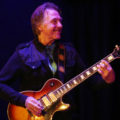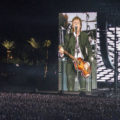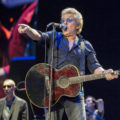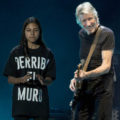Take a trip to “Penny Lane” with The Quarrymen, the band that started The Beatles
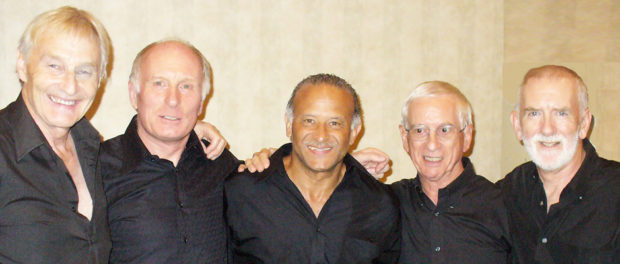 Photos provided by The Quarrymen
Photos provided by The Quarrymen
If it hadn’t been for The Quarrymen and the voluntary departure of banjo player Rod Davis, it’s extremely possible there may have never been The Beatles.
That’s because the early rock & rollers weren’t just the group that introduced John Lennon, but were also responsible for recruiting Paul McCartney, and a little later, bringing George Harrison into the history-shattering scenario.
Though the original players in The Quarrymen went their separate ways as the late 1950s rolled into the ‘60s, many reunited in 1997 to commemorate the group’s 40th anniversary, keeping the tunes and tales coming right up until today.
In honor of the latest line-up’s “Live! In Penny Lane” CD, returning member Davis gave Chicago Concert Reviews an all access glance into the new recording, his prior decision that opened the door for Sir Macca and a fascinating timeline of the band that morphed into “The Fab Four.”
What were the factors in putting together the set list that wound up shaping the “Live! In Penny Lane” CD?
Rod Davis: Basically, we needed a new CD. Our first, “Get Back Together,” was made in 1997 with Pete Shotton, Eric Griffiths, Len Garry, Colin Hanton and myself – all the guys who were on stage with John on 6 July 1957, when he and Paul first met. Then in 2004, we were invited to Japan and subsequently made a CD for the Japanese market called “Songs We Remember,” although it was recorded in Liverpool.
 Over the years, we have tried several times to record a live show, but there were always problems with the sound quality. We decided to invite a small audience, free of charge, so that if necessary, we could repeat one or two numbers if they had not gone too well, and even ask the audience to laugh a bit more at a joke! At our live shows, we always take time to talk about the songs and that was not the case on our two previous CDs. This one is more or less the current set-list for one of our live shows, together with the spoken introductions.
Over the years, we have tried several times to record a live show, but there were always problems with the sound quality. We decided to invite a small audience, free of charge, so that if necessary, we could repeat one or two numbers if they had not gone too well, and even ask the audience to laugh a bit more at a joke! At our live shows, we always take time to talk about the songs and that was not the case on our two previous CDs. This one is more or less the current set-list for one of our live shows, together with the spoken introductions.
Can you take us back to the day it was recorded and what the feeling was between the band and the crowd?
Davis: It was a very relaxed afternoon. Ninety-five percent of the audience were personal friends and family, so it was a very happy atmosphere, helped along by a few glasses of wine!
Tell us a bit about the significance of picking that particular venue.
Davis: Our drummer, Colin Hanton, lives nearby and he had held the launch party for his autobiography at the Penny Lane Development Centre, at which The Quarrymen had played. The room was good acoustically and the staff are very friendly. They sell lots of Beatles memorabilia, including our Quarrymen CDs and T-shirts, and in March, they were not open on Sundays, so they were very happy to let us use the venue. It worked very well. In 1957, we had played next door in a dance hall known as “Barney’s,” which was St. Barnabas’ Church Hall at the time, so it was our old stamping ground.
How is a Quarrymen concert of today similar to how it was in the past and in what ways is it different?
Davis: There are several major differences, the main one being personnel. Sadly, we don’t have Eric Griffiths on guitar. He died in 2005. Pete Shotton played washboard and tea-chest for us from 1997 to 2000, when he retired through ill-health. Pete died in 2017. John Duff Lowe played piano with us from 1995, but in the last year, he has had problems with his hands and has difficulty playing, so he decided to retire from actual performance with us and did not appear on the CD.
We never used to have a permanent electric bass player, but since Pete Shotton retired, we have had guest electric bassists until a couple of years ago when we met Chas Newby, who was suggested to us by a friend called Martin Lewis. Chas played bass for the actual Beatles in December 1960 in Liverpool for four gigs when they returned home, having left Stuart Sutcliffe in Hamburg with his girlfriend, Astrid Kirchherr. Chas is now a great asset to the band as he is also a very good vocalist.
 Another major difference is that Len Garry now plays guitar and sings most of the rock & roll numbers. Len is a huge Elvis [Presley] fan and he really enjoys belting out songs like “Blue Suede Shoes.” I play guitar instead of banjo and get to sing most of the skiffle numbers.
Another major difference is that Len Garry now plays guitar and sings most of the rock & roll numbers. Len is a huge Elvis [Presley] fan and he really enjoys belting out songs like “Blue Suede Shoes.” I play guitar instead of banjo and get to sing most of the skiffle numbers.
Prior to 2009, we never played any guitar solos. Until George joined The Quarrymen, no one was capable, and indeed until 1958, no one had an electric guitar or an amplifier. But in 2009, we were invited to Germany to record a DVD of a live performance for Horst Fascher’s Star Club and the director, Gary Danker, suggested we worked up a couple of guitar solos. So from then onwards, I have played what I hope are some 50s-style solos during the rock & roll numbers.
Why did you decide to leave The Quarrymen and what brought you back?
Davis: The Quarrymen were playing more and more rock & roll, which I thoroughly disliked at the time, although I have changed my mind since then, and you can’t be a banjo player in a rock & roll outfit. Pete Shotton hung up his washboard about the same time. More importantly, at the end of July 1957, John, Pete and Eric all left Quarry Bank School, whilst I stayed on for another couple of years to take more exams to get into university. I was having to do much more homework and probably would not have had the time to play with them anyway. Basically, The Quarrymen left me rather than the other way round and Paul McCartney filled the place which I had vacated.
I had always thought it would be a fun idea to reunite The Quarrymen for a gig or two. Duff and I had been invited to the L.A. and Chicago Beatlefests in 1995 and I realized that there was potential in getting the group back together. We were all invited to The Cavern [Club’s] 40th birthday party in 1997, and then we were invited to help re-create “The Day John Met Paul” in July 1957, and things just happened from there.
What was John Lennon like as a band mate?
Davis: John was always the lead singer, so if he didn’t like a song, we didn’t play it. The rest of us just joined in the choruses with no attempt at harmony. He was by no means dictatorial, but it was his group and the rest of us deferred to him as the leader. He was no great guitarist, sticking to the three basic banjo chords his mother had taught him. If he busted a string mid-song, he would turn to me, hand his guitar, take my banjo and finish the song, by which time I was supposed to have replaced the broken string.
I bought a banjo tutor and started playing chords higher up the neck, but John told me to play in the first position, the same as him and Eric. Clearly he did not want to be upstaged by a mere banjo player.
 When the band morphed into The Beatles, how did you feel about its gargantuan level of success?
When the band morphed into The Beatles, how did you feel about its gargantuan level of success?
Davis: From 1963 to 64, when the Beatles really started to hit the big time, I was working in southern Germany, teaching English. When I phoned my parents, they would tell me how the band was getting on, but I did not hear much about them until I returned to the UK in September 1964. The problem with the music scene in Britain was that it was totally controlled from London, so it was just fantastic that a group from Liverpool could enjoy such huge success and “put one in the eye” of the rest of the country. Ever better because I had been part of the original group.
What was your reaction to having The Quarrymen included on The Beatles’ “Anthology 1” collection?
Davis: Well, unfortunately for me, I had ceased playing with The Quarrymen by the time they recorded “That’ll Be The Day” and “In Spite Of All The Danger,” but nevertheless, I very much enjoyed the reflected glory!
How much did you stay in touch with John over the years? Did you wind up getting to know Paul and George?
Davis: The last time I saw John was in Liverpool in March 1962. We bumped into each other in the street and started chatting. He asked me what instruments I was playing. I told him that I was very keen on bluegrass, and was playing guitar, fiddle and mandolin. He said “what a pity” I couldn’t play the drums or I could have come and played with them in Hamburg!
Paul I only met very briefly in 1957 one day when we were practicing at [Lennon’s] Aunt Mimi’s house and he had come to listen. Obviously, in retrospect, he had been invited to join the group in my place, but I wasn’t thrown out in favour of him. I just drifted out. I spoke to him for a few minutes in 2005 when I bumped into him on the promenade at Brighton when he was going for a walk with his dog. I introduced myself as the man he replaced in The Quarrymen in 1957. He said “What happened? Did I elbow you aside?” I explained I was a banjo player who did not fit into a rock & roll group anyway. We chatted for a few minutes, then his dog grew restless and off he went.
I have never met George, or indeed Ringo [Starr], to my regret.
In what ways might “Live! In Penny Lane” appeal to fans of The Beatles and are there any other audiences you feel would especially enjoy it?
Davis: I think the main appeal is that the CD contains the sometimes lengthy introductions and stories, which our live audiences appreciate very much. They say that “the music is great, but what we enjoy even more is to hear you guys talking about what it was really like.”
 Are there any plans to bring this show to America at any point when it’s safe to do so?
Are there any plans to bring this show to America at any point when it’s safe to do so?
Davis: We have, of course, played in America often, maybe as many as ten times. Our last visit [was] in 2010 and we have always had a great time. One problem is that we are all around the 80-years-old mark, and whilst the performing is no problem, the travelling is getting very hard, so we tend to limit ourselves to weekend trips to Europe these days. But you never know!
Do you have any recollections of coming to Chicago?
Davis: Both times we played in Chicago, we had a terrific lunch of buffalo chicken wings whilst listening to the music in Andy’s Jazz Club and we looked through the all the old records in the Jazz Record Mart. One funny story resulted from some kind assistance from a Chicago Beatles fan, Jay Goeppner, who worked for the airline with whom we were travelling back to England. Jay offered to try to get us an upgrade, so when my wife and I boarded our plane for London, sure enough we found ourselves comfortable installed in business class. Unfortunately for Len and Colin, who were flying back to Manchester, this was not possible. However, Jay had arranged for a complimentary bottle of champagne to be served to them on the aircraft. Len and Colin were, of course, unaware of this kind gesture and had moved seats to give themselves more room. Another couple who had taken their vacant seats were served with Len and Colin’s complimentary bottle of champagne. Only when Jay emailed us to ask if the champagne went down well did Len and Colin understand what had happened! “Oh yes,” said Colin, “these two people who were sitting in our old seats were gobsmacked when a bottle of champagne arrived for them, compliments of the airline. We never realized that it was actually meant for us!”
For additional information on The Quarrymen, visit OriginalQuarrymen.co.uk.

